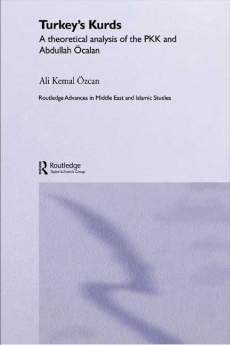| Éditeur : Routledge | Date & Lieu : 2006, London |
| Préface : | Pages : 282 |
| Traduction : | ISBN : 0-203-01959-8 |
| Langue : Anglais | Format : 152x228 mm |
| Thème : Politique |
|
Présentation
|
Table des Matières | Introduction | Identité | ||
 Turkey’s Kurds The Kurdish Worker’s Party (PKK) is examined here in this text on Kurdish nationalism. | |||||
| Preface There have been many rebellions recorded in Kurdish history, each bearing the ethnic demands of Kurdishness to varying degrees. With the PKK-led movement,1 Kurdish ethnicity has entered into a supra-tribal resistance. It has moved towards becoming a national entity, transcending the societal and geographic boundaries of tribal structures. The major objective of this book is to examine the extent of the party’s organizational share in this process. Whether or not Kurdish tribalism is prospering in the north of Iraq—thanks to the USled coalition forces’ ‘Operation Iraqi Freedom’—continues to remain a highly dubious question. In the past decade, Kurds of Iraq have reached the threshold of a nation-state2 under the KDP3 and PUK4 by experiencing self-government. The Kurds of Turkey underwent a considerable detribalization under the PKK to the extent that Turkish intelligence sources publicly acknowledged it as ‘a contribution’5 to the social development in the ‘south-east’. In the wake of Saddam’s downfall, attention is increasingly paid to the developing self-rule of Kurds in the ‘Safe Haven’,6 even if it has so far been managed under a double-headed balance.7 Growing grievances from shifting parties towards the controversial interim governing body of Iraq encourages some to fear the probable ‘Lebanonization’ of Iraq (Alkadiri and Toensing 2003), and this in turn threatens the initial assurances concerning the ‘territorial dignity’ of post-Saddam Iraq. Of the recent pile of articles appearing in various journals and papers, the ones pointing to the division of Iraq into three individual states (Sunnis, Shiites and Kurds), which are substantially inspired by the experience of the de facto Kurdistan, are gradually coming to prominence. The ‘unnatural’ state of existing Iraq dominates the fateful worries about her ‘territorial dignity’. Policy-making experts of the region have for some time publicized the ‘unthinkable’ as ‘the only viable strategy’ for—they think—‘the costs of preventing the natural states from emerging had been terrible’: For decades, the United States has worshiped at the altar of a unified yet unnatural Iraqi state… Washington would have to be very hard-headed and hard-hearted, to engineer this break-up. But such a course is manageable, even necessary, because it would allow us to find Iraq’s future in its denied but natural past. A former US Ambassador to Croatia, Peter W.Galbraith, who contributed to the creation of a safe haven for the Kurds, prophesies that ‘Kurdistan will be virtually independent’.9 Simon Jenkins recommends the break-up of Iraq as ‘the only hope’ for a democratic future: Those who try to do the undoable must also think the unthinkable.’10 Scholars in the field also concede that well over half of the world’s 25 million to 30 million Kurds live in Turkey. The emerging statehood in the ‘South’ (north of Iraq) is, in effect, more vital to the Turkish polity than anything else in Iraq:
Turkish officials fear that a Kurdish autonomization of some sort would incite their own Kurdish population, leading to a separation. On the other hand, the ‘indispensability’ of Turkey to the West—especially to the USA—worsens the vicious convolution already there. The question of Turkey’s far larger share of the Kurdish populace is forcing Turkey-US relations into a cul-de-sac more than ever.11 The existing literature on the Kurds of Turkey is confined within the fields of history and power relations of regional/global politics. Kurds are overwhelmingly—and euphemistically—being studied ‘as the “Kurdish Problem” in its intrastate dimensions and as the “Kurdish Question” in its trans-state context’ (Olson 1998:xviii). The studies made so far, on Turkey’s Kurds in particular, do not endeavour to recognize the fact of the population at issue. No complete study of a sociological nature engaging with Kurds exists in the Turkish academic literature. Restricted/biased political approaches constitute virtually the entire overall composition of the intellectual domain in this regard. movement in Turkey. The main focus of analysis is hence the PKK—its ideational and material structure. Because it is the leading entity of the issue, the research focuses on the PKK’s growth (from the late 1970s to the mid-1990s) and its recent shrinkage. Within the framework of the case-study method, much of the research is devoted to answering an indirect question: why wasn’t it the other Kurdish ‘national organizations’ that came to prominence? Asking how the organization became capable of revitalizing the ‘buried’ body of Kurdishness in Anatolia that has been incorporated (in both demographic and geographical terms) into the Turkicized Republic, the study tries to appraise the extent of national and non-national ingredients in the makeup of the movement—the leadership, the grass roots and the masses that give their support. Ali Kemal Özcan | ||||